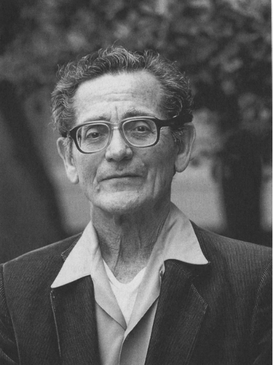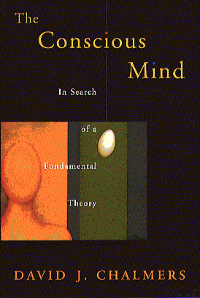Neutral monism is an umbrella term for a class of metaphysical theories in the philosophy of mind, concerning the relation of mind to matter. These theories take the fundamental nature of reality to be neither mental nor physical; in other words it is "neutral".
The distinction between subject and object is a basic idea of philosophy.
Solipsism is the philosophical idea that only one's mind is sure to exist. As an epistemological position, solipsism holds that knowledge of anything outside one's own mind is unsure; the external world and other minds cannot be known and might not exist outside the mind.

John Rogers Searle is an American philosopher widely noted for contributions to the philosophy of language, philosophy of mind, and social philosophy. He began teaching at UC Berkeley in 1959, and was Willis S. and Marion Slusser Professor Emeritus of the Philosophy of Mind and Language and Professor of the Graduate School at the University of California, Berkeley, until June 2019, when his status as professor emeritus was revoked because he was found to have violated the university's sexual harassment policies.

Consciousness Explained is a 1991 book by the American philosopher Daniel Dennett, in which the author offers an account of how consciousness arises from interaction of physical and cognitive processes in the brain. Dennett describes consciousness as an account of the various calculations occurring in the brain at close to the same time. He compares consciousness to an academic paper that is being developed or edited in the hands of multiple people at one time, the "multiple drafts" theory of consciousness. In this analogy, "the paper" exists even though there is no single, unified paper. When people report on their inner experiences, Dennett considers their reports to be more like theorizing than like describing. These reports may be informative, he says, but a psychologist is not to take them at face value. Dennett describes several phenomena that show that perception is more limited and less reliable than we perceive it to be.

David John Chalmers is an Australian philosopher and cognitive scientist specializing in the areas of the philosophy of mind, and the philosophy of language. He is a professor of philosophy and neural science at New York University, as well as co-director of NYU's Center for Mind, Brain and Consciousness. In 2006, he was elected a Fellow of the Australian Academy of the Humanities. In 2013, he was elected a Fellow of the American Academy of Arts & Sciences.
Eliminative materialism is a materialist position in the philosophy of mind. It is the idea that the majority of mental states in folk psychology do not exist. Some supporters of eliminativism argue that no coherent neural basis will be found for many everyday psychological concepts such as belief or desire, since they are poorly defined. The argument is that psychological concepts of behavior and experience should be judged by how well they reduce to the biological level. Other versions entail the nonexistence of conscious mental states such as pain and visual perceptions.

In the philosophy of mind, panpsychism is the view that the mind or a mind-like aspect is a fundamental and ubiquitous feature of reality. It is also described as a theory that "the mind is a fundamental feature of the world which exists throughout the universe". It is one of the oldest philosophical theories, and has been ascribed to philosophers including Thales, Plato, Spinoza, Leibniz, William James, Alfred North Whitehead, Bertrand Russell, and Galen Strawson. In the 19th century, panpsychism was the default philosophy of mind in Western thought, but it saw a decline in the mid-20th century with the rise of logical positivism. Recent interest in the hard problem of consciousness, and developments in the fields of neuroscience, psychology, and quantum mechanics have revived interest in panpsychism in the 21st century.
Galen John Strawson is a British analytic philosopher and literary critic who works primarily on philosophy of mind, metaphysics, John Locke, David Hume, Immanuel Kant and Friedrich Nietzsche. He has been a consultant editor at The Times Literary Supplement for many years, and a regular book reviewer for The Observer, The Sunday Times, The Independent, the Financial Times and The Guardian. He is the son of philosopher P. F. Strawson. He holds a chair in the Department of Philosophy at the University of Texas, Austin, and taught for many years before that at the University of Reading, City University of New York, and Oxford University.

In the philosophy of mind, the hard problem of consciousness is to explain why and how humans and other organisms have qualia, phenomenal consciousness, or subjective experience. It is contrasted with the "easy problems" of explaining why and how physical systems give a (healthy) human being the ability to discriminate, to integrate information, and to perform behavioral functions such as watching, listening, speaking, and so forth. The easy problems are amenable to functional explanation—that is, explanations that are mechanistic or behavioral—since each physical system can be explained purely by reference to the "structure and dynamics" that underpin the phenomenon.
Henry Pierce Stapp is an American mathematical physicist, known for his work in quantum mechanics, particularly the development of axiomatic S-matrix theory, the proofs of strong nonlocality properties, and the place of free will in the "orthodox" quantum mechanics of John von Neumann.

Benjamin Libet was an American neuroscientist who was a pioneer in the field of human consciousness. Libet was a researcher in the physiology department of the University of California, San Francisco. In 2003, he was the first recipient of the Virtual Nobel Prize in Psychology from the University of Klagenfurt "for his pioneering achievements in the experimental investigation of consciousness, initiation of action, and free will".

Property dualism describes a category of positions in the philosophy of mind which hold that, although the world is composed of just one kind of substance—the physical kind—there exist two distinct kinds of properties: physical properties and mental properties. In other words, it is the view that at least some non-physical, mental properties exist in, or naturally supervene upon, certain physical substances.
Max Velmans is a British psychologist and Emeritus Professor of Psychology at Goldsmiths, University of London, principally known for the theory of consciousness called "reflexive monism".
The philosophy of mind is a branch of philosophy that deals with the nature of the mind and its relation to the body and the external world.

"What Is It Like to Be a Bat?" is a paper by American philosopher Thomas Nagel, first published in The Philosophical Review in October 1974, and later in Nagel's Mortal Questions (1979). The paper presents several difficulties posed by consciousness, including the possible insolubility of the mind–body problem owing to "facts beyond the reach of human concepts", the limits of objectivity and reductionism, the "phenomenological features" of subjective experience, the limits of human imagination, and what it means to be a particular, conscious thing.

The Conscious Mind: In Search of a Fundamental Theory was published in 1996, and is the first book written by David Chalmers, an Australian philosopher specialising in philosophy of mind. Although the book has been greatly influential, Chalmers maintains that it is "far from perfect", as most of it was written as part of his PhD dissertation after "studying philosophy for only four years".
The von Neumann–Wigner interpretation, also described as "consciousness causes collapse", is an interpretation of quantum mechanics in which consciousness is postulated to be necessary for the completion of the process of quantum measurement.

Donald David Hoffman is an American cognitive psychologist and popular science author. He is a professor in the Department of Cognitive Sciences at the University of California, Irvine, with joint appointments in the Department of Philosophy, the Department of Logic and Philosophy of Science, and the School of Computer Science.

Philip Goff is a British author, idealist philosopher, and professor at Durham University whose research focuses on philosophy of mind and consciousness. Specifically, it focuses on how consciousness can be part of the scientific worldview. Goff holds that materialism is incoherent and that dualism leads to "complexity, discontinuity and mystery". Instead, he advocates a "third way", a version of Russellian idealist monism that attempts to account for reality's intrinsic nature by positing that consciousness is a fundamental, ubiquitous feature of the physical world. "The basic commitment is that the fundamental constituents of reality—perhaps electrons and quarks—have incredibly simple forms of experience."










